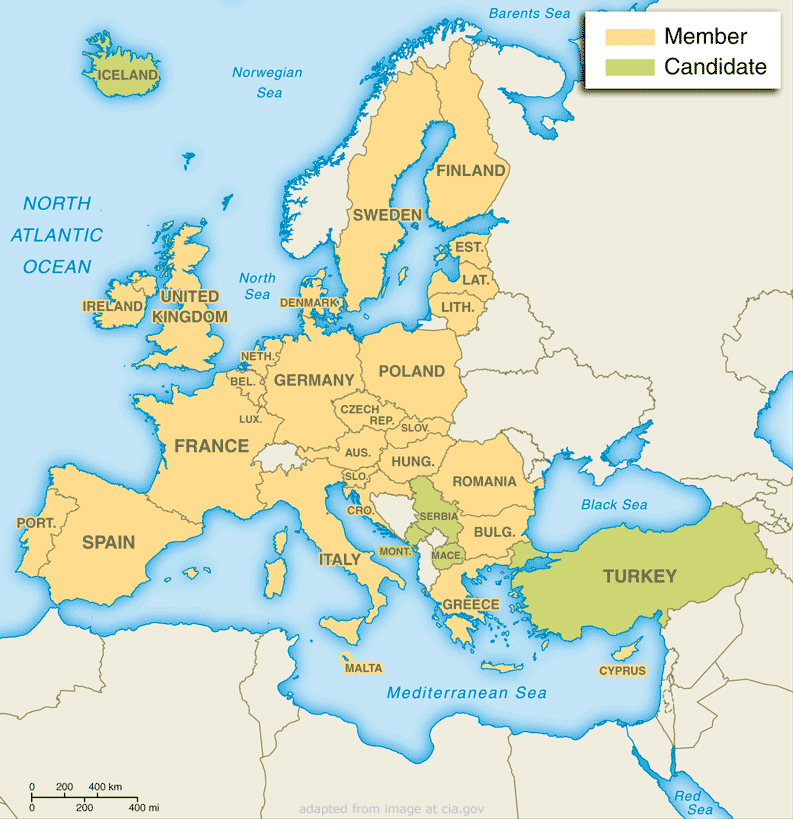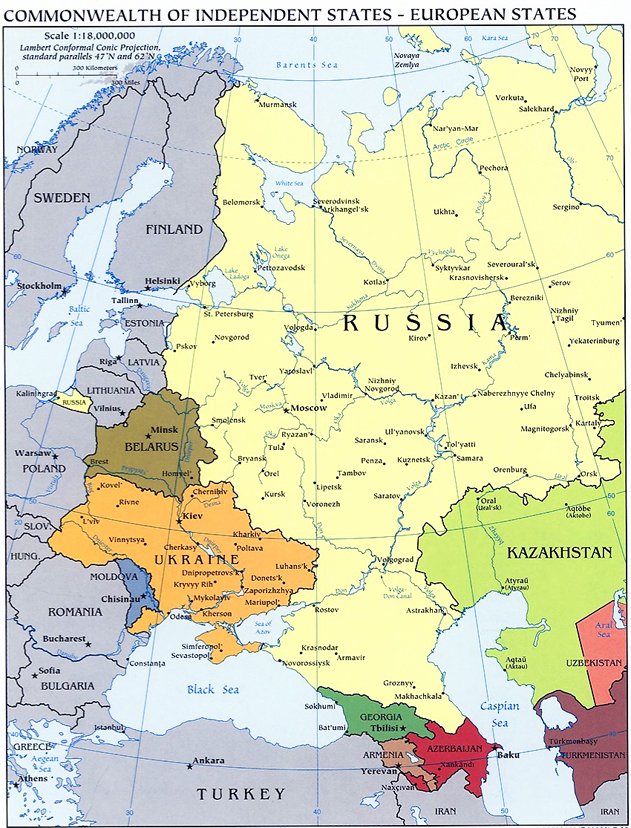Merkel Warns on Rush to Russia Sanctions, Reflecting EU Split

(Bloomberg – bloomberg.com – James G. Neuger, Ian Wishart and Jonathan Stearns – March 20, 2014) German Chancellor Angela Merkel said the European Union won’t rush to impose economic sanctions on Russia for the annexation of Crimea, reflecting concerns that trade curbs would damage Europe’s tentative recovery.
Germany, which is Russia’s biggest EU trading partner, expects the 28-country bloc to expand measures in place including travel bans and asset freezes, Merkel told lawmakers in Berlin today before leaving for an EU summit in Brussels. It is too early to enact “stage three” economic retaliation, she said.
Leaders will “make it clear that we’re always ready to enact stage-three measures if the situation worsens,” Merkel said. “And without any doubt, this will also be about economic sanctions.”
Special trading relationships that several countries have with Russia, coupled with the fallout from Europe’s debt crisis, are frustrating a united response to the most serious threat to the European order since the Cold War. One less controversial option would be to expand an existing blacklist of 21 Russian and Crimean political and military figures, EU officials said yesterday.
Sanctions require the agreement of all EU governments, a consensus-building process that can’t match Russian President Vladimir Putin’s speed in mobilizing troops in Crimea, staging the secession referendum and moving toward annexation.
Aid Ukraine
EU leaders normally set broad strategy, lessening the likelihood that the summit will decide legally binding steps. While sanctions have made the most headlines, the EU will also sign the political provisions of a trade agreement with Ukraine and consider speeding up its economic assistance.
The European Commission, the EU’s executive arm, yesterday proposed adding 1 billion euros ($1.4 billion) to a previously approved 610 million euros in budget support for Ukraine. The European aid would accompany an International Monetary Fund package that is being negotiated.
At a summit on March 6, the EU suspended trade and travel talks with Russia and paved the way to the imposition on March 17 of asset freezes and visa bans on 13 Russian and eight Crimean officials. The bloc also warned Russia that “any further steps” to “destabilize the situation in Ukraine” would trigger a host of economic restrictions.
Red Line
Leaders will spar today over whether Russia crossed that red line by taking control of Crimea. Luxembourg Prime Minister Xavier Bettel said that opinions within the bloc vary over whether the seizure of that majority-Russian-speaking region is the trigger for harsher penalties.
“Among the 28 there are very wide gaps,” Bettel said yesterday. “There are countries that have very different positions.”
The need for EU unanimity gives leverage to countries like Cyprus, which is chafing at the terms imposed by European governments in exchange for a 10 billion-euro bailout that ravaged the island’s economy.
Cyprus remains a beacon for Russian investment as it tries to fix an economy that shrank 6 percent last year. Foreign Minister Ioannis Kasoulides told state-run RIK radio on March 18 that Cyprus opposes further sanctions.
Whether fellow skeptics including Hungary and Bulgaria would endorse a ratcheting up of sanctions in exchange for financial compensation won’t become clear until the leaders assemble in Brussels at 4:30 p.m. today.
Keep Talking
“There is the need to keep a line of dialogue open,” Italian Prime Minister Matteo Renzi told parliament in Rome yesterday. Italy wants “a solution that doesn’t take us back to an Iron Curtain situation.”
One option is to widen the EU blacklist to include figures in Putin’s inner circle, officials said. The first list left the president’s office untouched, while the U.S. targeted Putin confidantes including Deputy Prime Minister Dmitry Rogozin, who was the Kremlin’s envoy to NATO when Russia invaded Georgia in 2008.
The U.S. and Europe will be working on more measures over the next several days that, if the current standoff continues, “could end up having a significant impact on the Russian economy,” President Barack Obama said in an interview with St. Louis television station KSDK recorded at the White House.
Ukraine’s Prime Minister Arseniy Yatsenyuk, who is also in Brussels, said in an interview early today that Russia will probably seek to stoke unrest in Ukraine’s Russian-speaking east and south.
Protect Russians
While Putin said March 18 that he has no desire to split Ukraine, Russia will continue to use political, legal and diplomatic methods to protect its citizens abroad, Foreign Minister Sergei Lavrov was cited by the Ria Novosti news service as saying today.
Debate over European sanctions has gone hand in hand with the question of how to share the costs of snubbing Russia. Banking curbs would hurt Britain, an arms embargo would bar France from selling Mistral-class helicopter carriers to the Kremlin, and cutbacks in purchases of Russian gas would harm a swathe of EU countries.
“An escalation risks higher commodity prices, higher inflation and lower growth,” U.K. Chancellor of the Exchequer George Osborne told Parliament in London yesterday.
Germany, which dominated the debt crisis response, is tugged between trade and energy links with Russia and calls by neighbors such as Poland and the Baltic states for a firmer response to aggression on the EU’s doorstep.
‘Stop Russia’
“We have to make some serious steps including asset freezes, economic sanctions,” Estonian Prime Minister Andrus Ansip, whose country shares a border with Russia, told reporters today in Brussels. “We have to stop Russia.”
Germany relies on Russia for 35 percent of its oil and natural gas imports. About 6,200 German companies generate exports of 36 billion euros and imports of 40.4 billion euros in trade with Russia, according to the BGA exporters’ lobby.
EU economic retaliation must be carefully sculpted, Austrian Chancellor Werner Faymann said March 18. Austria buys about 55 percent of its gas from Russia, and Austrian banks Raiffeisen Bank International and UniCredit Bank Austria are among the biggest in Russia.
Business ties are good for “promoting peaceful development on both sides,” Faymann said.
Article ©2014 Bloomberg L.P. All Rights Reserved Article also appeared at http://www.bloomberg.com/news/2014-03-19/russia-s-trade-energy-might-frustrates-eu-move-for-sanctions.html

